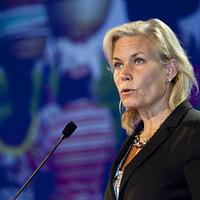Mr./(Madam) Chair, Excellencies, Distinguished delegates,
I thank you, Mr. Chair, for convening this meeting which offers an opportunity for the international community to reiterate its solidarity with the Pakistani people, along with the exchange of views on our future engagements. Sweden supports the statement made by Belgium on behalf of the European Union.
Let me express my deepest sympathy with the people of Pakistan. The floods that have ravaged the country have caused unprecedented damage. So far over 15.4 million have been affected. Along with loss of lives, there is a large number of displaced, and extensive damages have struck homes, livelihoods and infrastructure. Sweden is deeply concerned by the severe situation and wishes to extend its assurance of committed strong support to Pakistan.
Sweden appreciates the good cooperation between the Pakistan Government and the UN, resulting in the Response plan. The Swedish contribution to the flood response so far amounts to 11 MUSD. I am pleased to announce that Sweden tomorrow will take a decision to commit another 8,2 MUSD in support of the international efforts to help the Pakistani people in this crisis. We will ensure support, not least to the most vulnerable. This is why we also, on a regular and annual basis, provide core funding to main humanitarian organisations, such as UNHCR and UNICEF. I assure you that we will continue to take our responsibility.
The situation in Pakistan, as after the earthquake in Haiti, proved the importance of a well-coordinated international humanitarian system in order to ensure a quick and efficient response. During the last years, we have put a lot of effort in to developing the humanitarian response system under the leadership of the UN. Sweden remains strongly committed to the work of OCHA and the Emergency Relief Coordinator in this regard. The efficient functioning of the CERF as a key enabler for an initial humanitarian response serves as an excellent example. Sweden is one of the two largest donors to the CERF. We urges member states to enhance their contribution to the CERF.
Protracted armed conflicts, population growth, urbanisation, increased food prices and climate change are sources to tremendous and increasingly complex challenges. Not least do severe natural catastrophes, as we have seen in Pakistan, require the development of a proactive approach along side with the reactive humanitarian response system.
In order to do so, we need to focus even more of our efforts on preparedness and prevention. The international humanitarian community must be as efficient in providing mechanisms in this field, as in developing the humanitarian response system. Efficient and viable solutions to ensure enhanced resilience at the country level, must be found in collaboration with disaster prone countries, drawing on their experience and knowledge. Close cooperation between national governments, which hold the primary responsibility, and international efforts, is a condition for the construction of solid structures of disaster risk reduction at country level. Building local preparedness and preventive efforts are crucial to limit long term vulnerability.
In this regard, Sweden supports the important work carried out by the ISDR in building disaster resilient communities. Disaster risk reduction measures must be an integral part of our work, in order to ensure a much needed proactive approach.
Let me also take this opportunity to extend my sincere thanks to the Emergency Relief Coordinator Mr. John Holmes, whose tireless efforts over the past three years have been key in addressing humanitarian needs globally.
I thank you.
.jpg)